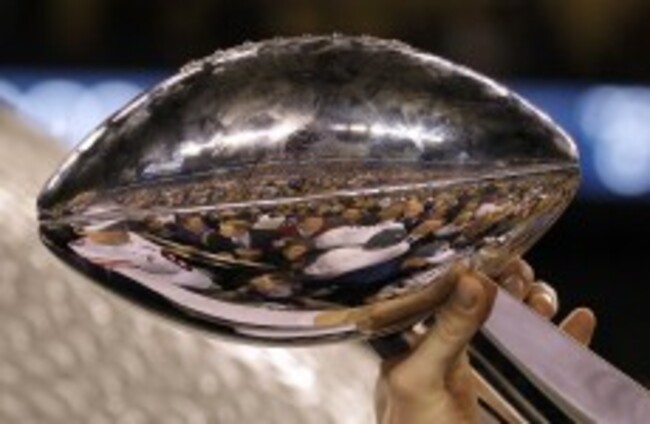Updated Sunday February 2.
FOR SOME OF you, Super Bowl XLVIII between the Denver Broncos and Seattle Seahawks tonight may well be your first experience of American football.
With that in mind, we’ve put together this handy guide to help you learn the difference between offence and defence, between a touchdown and a field goal and, perhaps most confusingly, between a safety (the play) and a safety (the player).
The league:
The NFL contains 32 teams split into two conferences, the American Football Conference (AFC) and the National Football Conference (NFC). Each conference is separated into four divisions, North, South, East and West with four teams in each. You can find a breakdown of each division here.
The field:
An American football pitch (or field) is 120 yards long and 53.3 yards wide. The most important parts are the two endzones, with one located at either end of the field. The ten yards between the front and back of the endzone is where touchdowns are scored.
The teams:
Each team has specialists on offence, defence and special teams but never have more than 11 players on the field at one time. In the NFL there are 53 active players allowed on every team which is why you see so many people standing along the sidelines during a game.
You can see how most teams line up on offence and defence here.
The offence is made up of:
- The offensive line (two guards, two tackles and a centre who protect the quarterback and running backs from being tackled).
- Two/four wide receivers who catch the ball or block on running plays.
- One/two tight ends who catch the ball or block on certain passing and running plays.
- One/two running backs who run and catch the ball while also blocking for the quarterback on some plays.
- The quarterback, who can pass, run with, or hand the football to the running back.
The defence is made up of:
- The defensive line who try to stop the quarterback and running back from moving the football.
- Linebackers who push forward to try and stop the running back and tackle the quarterback.
- Corner backs and safeties who, primarily, try to stop the receivers from catching the ball.
A map showing the geographic spread of all 32 NFL teams.
The play:
Possession in American football is similar to rugby league, with each offence having four ‘downs’ to advance the ball ten yards. When the offence succeeds in moving the ball at least ten yards, they are awarded with a fresh set of downs, meaning they have four more attempts.
To move the ball, a team can choose to run or throw, but only one forward pass is allowed in each play. The quarterback is perhaps the most well-known position in American football and, like an on-field general, he touches the ball on almost every play and — with the help of the offensive coordinator — decides if a play will involve a run, a pass or, in some cases, both. Trick plays, known as ‘play action’ are often used to fool defences.
In most cases, if a team has failed to move the ball forward ten yards on the first three downs, they punt the ball away (like kicking for position in rugby) or kick a field goal (worth 3 points) on the fourth.
Scoring:
Instead of field goals, most teams want to score touchdowns. These are registered when a team either runs or passes the ball into the endzone and are worth six points, with the point after (think conversion in rugby) worth one. You can also go for a two-point conversion by running or throwing into the endzone.
While it is usually the offence that scores, the defence can get in on the action too. If the defence intercepts a pass (a pick) or forces an opposition player to fumble the football, they can run the ball into their opponent’s endzone for six points.
Defences can also force a safety. This is worth two points and occurs if they tackle an offensive player in the offence’s own endzone.
The clock:
Games are divided into four 15-minute quarters, separated by a 12-minute break at halftime. There are also two minute breaks at the end of the first and third quarters as teams change ends of the field. At the end of the first and third quarters, the team with the ball retains possession heading into the following quarter.
Each offensive team has 40 seconds from the end of a given play until they must snap of the ball for the start of the next play, otherwise they will be penalised.
The clock stops at the end of incomplete passing plays, when a player goes out of bounds, or when a penalty is called. The clock starts again when the ball is re-spotted by an official.
If a game is a draw (tied) at the end of regulation, a 15-minute overtime period will be played. In the NFL, the first team to score a touchdown wins. A field goal can also win a game in overtime but only if both teams have had possession of the football.
Basics:
So, that’s the basics of American football covered but there’s a lot more goes on during a game than we can deal with here. However, I will be answering any questions you may have in tonight’s Super Bowl liveblog/open thread.
Originally published January 28, 2013.












The main reason people give out about NFL is the advertising breaks making the game too stop/starty (if that’s a word). But if you look past that and look at the sheer athleticism of the players and get an understanding of the tactics it is such an enjoyable sport.
People need to give NFL a chance.
For most games except Super Bowl I just record it let most of the first half pass then start watching it while skipping all the ad breaks, I usually catch up with real time at the 2 minute warning
Great article for the beginners, keep up the good work – Go Ravens!
Oh Jesus, how does anyone watch that shite????
Over 150 million will watch it on Sunday.. Must be kinda popular
It’s truly an awful sport
Give me a Hurley and sliotar any days. #realsport
To those who think there is little skill or footwork involved, just look at some dexterity and athleticism by the receivers and quarterbacks during any game.
One rule I would appreciate clearing up of is, when a kick / punt is made sometimes the opposition just let the ball hit the ground and leave it. The team kicking the ball do not appear to try and catch the ball a la Garryowen?
What are the do’s and don’t around kicking (not for points)?
…and yest it is a game very conducive to eating and drinking!
Hi Kieran,
On a punt, the punting team cannot regain possession unless the ball touches one of the receiving team’s players first. So, even if the ball bounces and is not caught, it is still considered ‘received’ by the receiving team.
If, however, someone on the receiving team tries to catch it and drops the ball or it bounces and hits one of the receiving team and stays in play, then it’s treated the same as a fumble and can be recovered by either team.
Thanks Steven,
Much clearer now.
Is that just because the chasers were ahead of the kicker and are offside, as such. If they were behind the kicker, would they be allowed to play the ball?
Throwball is what I call it, hardly and foot involvement whatsoever.
Makes for a great excuse to get pretty wasted though (at least in America, anyway!)
Dodge, I think it’s called football because the ball is a foot long.
I actually think it’s called American football cause it’s the American version or deviation of rubgy. As rubgy stemmed from soccer(association football) American football stems from rubgy.
Could have done with a line on special teams
Watching it on C4 tonight, comon Seahawks
Brilliant sport.
It’s quite amazing that the majority of people who I know who scoff at it prefer to watch millionaire soccer fannies collapse in a heap after the softest of tackles simulating life threatening injuries in some pathetic attempt to cheat an advantage.
You forgot the fullback who protects the Running Backs runs.
Didn’t realise until now there are only 6 teams in the west.
Every year, Wrestlemania gets more viewers than the Super Bowl
100 million plus watching the superbowl alone in America , wrestlemania pulls in about 20 million worldwide ,go get your facts right